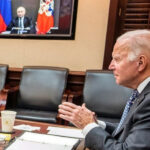Kathmandu, December 31
The Nepal Mazdoor Kisan Party (NMKP) has claimed that the Millennium Challenge Corporation (MCC) agreement is traitorous. The party offered various arguments and claimed that the agreement was unpatriotic. In a public appeal, the party said in a State Department document that the MCC had been assisting various countries since 2004 in line with the US Indo-Pacific strategy and would also assist Sri Lanka. However, claiming that Sri Lanka had rescinded the agreement, Nemkipa claimed in the document that the then US President Donald Trump had stated that the US had a long-standing military alliance with Indo-Pacific countries in 2017 and would maintain it for many years to come.
he appeal states, ”Thus the MCC body was formed to form a military front in accordance with the US Indo-Pacific strategy.” Therefore, this agreement with the MCC is the Indo-Pacific strategy of the United States, it is poison.’
Another US Department of Defense document, the Indo-Pacific Strategy Report 2019, states that Nepali officials met with Davidson, the US military commander in the Indo-Pacific region, who arrived in Nepal on January 11 of the same year. Nemkipa has also made it clear that it will be built.
Article 4.8 of the MCC Agreement states that the MCC body has appointed an Assistant Vice President to the Department of Operations as Additional Representative for Europe, Asia, Pacific and Latin America. I Article 6.8 of the MCC agreement states that in case of loss or death of a Nepali due to this agreement, no complaint will be lodged. Both clauses make it clear that Nepal will become a new colony of the United States.

The appeal states, ‘In Schedule 5 (a) of the MCC Agreement, the Government of Nepal must submit a plan to the satisfaction of the MCC body and such plan must have the support of the Government of India and include the principle of construction of Gorakhpur transmission line to make Nepal a state of India.’
NEMKIPA has also questioned the ruling parties’ argument that such a provision should be included in the agreement to ‘sell the surplus electricity to Nepal to India’ in the current situation of having to import and burn 800 MW of expensive electricity from India. The appeal asks, ”When will Nepal get more electricity?” When will there be enough electricity for the people of Himal-Pahad-Terai of Nepal to cook food at home and make air- conditioned arrangements, to run industry-trade, to increase agricultural production, to operate means of transportation?’
Nemkipa claims that this agreement is also against the non-aligned foreign policy. ”No matter how much money comes in for free, no country’s assistance can be compared to the sovereignty of the country,” the appeal said.
By Karuna Thapa


